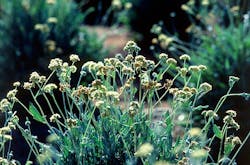Bridgestone researches natural rubber sources
Bridgestone Corp. announced the Bridgestone Group’s plans for an extensive research project in the United States. The project will be dedicated to developing Guayule as a commercially viable, renewable source of high-quality natural rubber and as an alternative to the Hevea tree.
Guayule (pronounced Why-u-lee) is a perennial shrub native to the southwestern United States and northern Mexico. This plant produces natural rubber in its bark and roots.
Bridgestone says satural rubber from Guayule has almost identical qualities compared to natural rubber harvested from Hevea trees, which is currently the primary source for the natural rubber used in tires.
This project is being done by Bridgestone Americas Tire Operations (BATO) in collaboration with BSJ. BSJ is providing the funding and strategic input for the effort, while BATO will be responsible for finding the suitable location and operating the pilot farm and process research facility.
BATO will also leverage the resources of the Bridgestone Americas Center for Research and Technology and its Akron, Ohio, Technical Center to provide technical and research expertise.
The company expects to finalize a location, establish the research farm and begin construction on the process research center later in 2012. The facility is expected to be fully operational in 2014. Trial rubber production should start in 2015.
“This is such an exciting and innovative project. It will not only help our companies meet the strong, anticipated growth in demand for natural rubber, but also constitutes a potential breakthrough for the rubber industry,” says Bill Niaura, director of new business development for Bridgestone Americas, Inc. (BSAM).
“This project demonstrates our commitment to environmental stewardship and sustainability through its potential to develop a renewable resource for natural rubber that can be grown, harvested and processed closer to market.”
